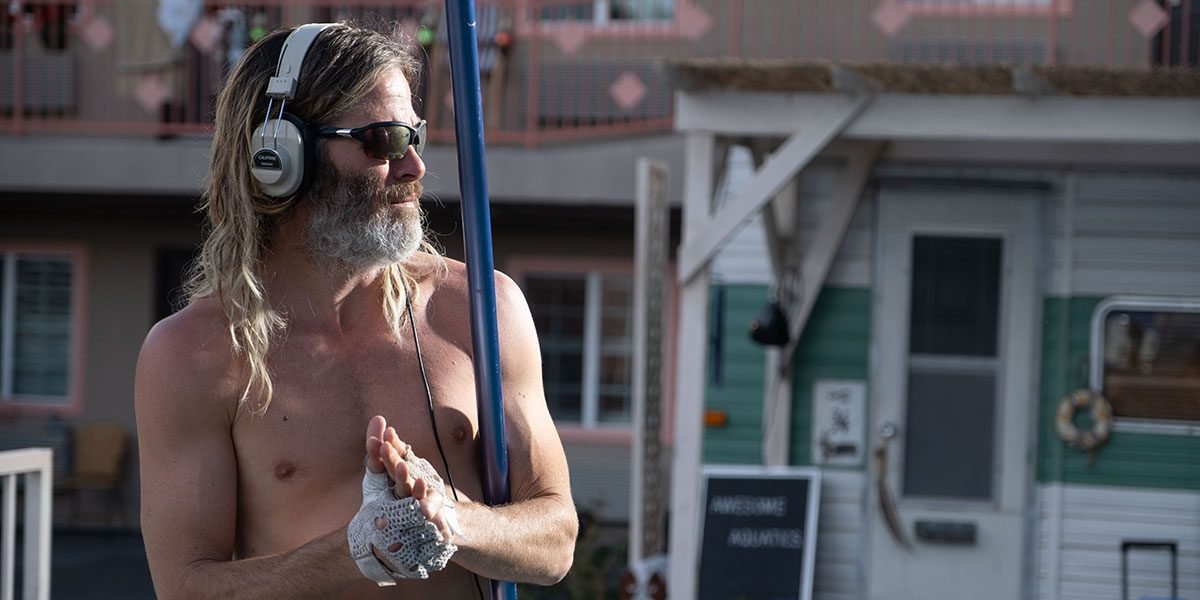TIFF23: “Poolman” - Film Review
This review was originally posted on Film Obsessive.
Every film festival has at least one movie (but sometimes more) that is immediately divisive. There are walk-outs, scathing reviews, and nasty, word-of-mouth rumors. Nothing unites people quite like hating a movie, but there are always the few champions of the film who liked it and feel the need to get the truth out there. In the case of this year’s TIFF, the movie that’s caused quite the stir is Chris Pine’s directorial debut, Poolman. Now admittedly, Poolman isn’t for everyone. No movie is made for everyone. We all have our personal likes and dislikes, and that’s what makes art enduring. Our ability to disagree civilly is important, but that skill has been lost in recent years, both in film criticism and life in general. Instead of thoughtfully explaining what worked and what didn’t, there’s a desire to rip something apart.
People mistake rudeness for critique, but in actuality, there’s nothing kinder than offering suggestions for growth and change. Which, ironically, is somewhat at the heart of Poolman. The film is about a humble poolman, Darren (Pine), who maintains a pool at a small apartment complex somewhere in LA. The audience is introduced to him as he dances around the pool’s edge in the shortest swim trunks you’ve ever seen with a portable CD player (playing opera) clipped to his hip. If you’re not onboard with the tone of the film from the get-go, then Poolman is not for you. Those who give it a chance though, will find that the film washes over them with its weirdness.
Poolman is a spiritual sibling to Under the Silver Lake from 2018. Both center on men in Los Angeles who are convinced they’re unraveling a deep, dark conspiracy that will shake the very foundation of the region. In Poolman, Darren is given information that he believes will help him topple the Los Angeles County government. He’s given this cryptic information by June (DeWanda Wise), the fantastic femme fatale character. Darren is accompanied on his romp throughout LA by his friends (who may or may not be his parents) Jack (Danny DeVito) and Diane (Annette Bening), who are helping him film a documentary about the injustices of the gentrification of Los Angeles. Darren hates big real estate millionaires coming in and forcing out all the people who have lived in the neighborhood for years.
Courtesy of TIFF
Poolman isn’t overt in terms of its references. So many movies now aggressively elbow audiences in the ribs asking, did you see what we did there? Poolman doesn’t. There are countless movies trying to be Chinatown, and despite its numerous mentions within the film, Poolman doesn’t want to be a remake of Chinatown. Darren simply uses Chinatown as research because that’s exactly what a man who has multiple outfit considerations for a stakeout (and chooses to go with an ode to Cary Grant) would do. Poolman knows what it’s doing and what it’s paying homage to, so it doesn’t need to tell the audience. This backlash against the film feels akin to what Josie and the Pussycats endured in 2001 when critics fell all over themselves as they tried to rip apart the film, never realizing that the movie knew the jokes it was telling.
Sure, some of the jokes are very LA-specific (who among us hasn’t tried to save a failing relationship with tickets to Descanso Gardens), but most of the time the film is laughing at itself. Poolman, above all else, is weird. It’s the eccentric adaptation of Joan Didion’s Holy Water in the form of a stoner noir oddball comedy. When you have DeVito carrying around a camera while wearing a Victorville Film Festival hat, you simply know the movie doesn’t take itself seriously. Benning puts on a stupendous performance, flexing comedic muscles that aren’t used often enough. Poolman is likely right up the alley of anyone who enjoyed The Nice Guys or Under the Silver Lake.
Even if you found the plot or the characters to be grating, it’s hard to look at Poolman and say there’s nothing redeeming about the film. The production design is a beautiful, retro, art deco ode to the long-gone era of film noir. The black-and-white shadows of yesteryear are traded for sundrenched light and gleaming neon. This movie could have taken place today or thirty years ago; there’s nothing that ties it to a specific time period. Perhaps that speaks to the longevity of the problem at the heart of Poolman: capitalistic greed.
Poolman is what you make of it. If you walk into the theatre certain that it’s going to be one of the biggest bombs of the year, then Poolman will support that mindset. The same goes for almost any movie. If you let it, though, you might find this one’s just vibey enough to be a good time.
Follow me on BlueSky, Instagram, Letterboxd, & YouTube. Check out Movies with My Dad, a new podcast recorded on the car ride home from the movies.

